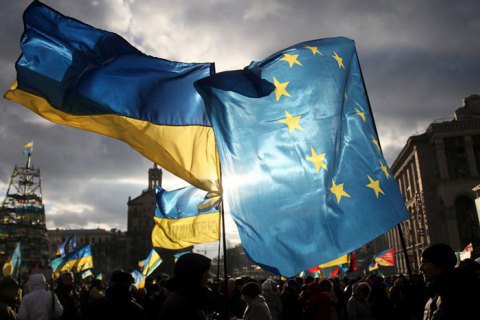European Union leaders have approved a declaration saying "yes" to Ukraine's European integration. Lithuanian President Gitanas Nauseda informed about it, calling the decision historic.
"A historic night at Versailles. After five hours of heated discussions, EU leaders said yes to Ukrainian eurointegration. The process started," Nausea wrote on Twitter following a five-hour debate between EU leaders.
A historic night at Versailles. After five hours of heated discussions EU leaders said yes to Ukrainian eurointegration. The process started. Now it is up to us and Ukrainians to accomplish it fast. Heroic Ukrainian nation deserves to know that they are welcome in EU.
— Gitanas Nausėda (@GitanasNauseda) March 11, 2022
The EU's emergency summit on Russia's aggression against Ukraine took place on the night of 11 March in Versailles. One of the most controversial issues discussed at the meeting was Ukraine's accession to the EU.
"Now, the Ukrainians and we must do it quickly. The heroic Ukrainian nation deserves to know that it is welcome in the EU," the Lithuanian president added.
A historic night at Versailles. After five hours of heated discussions, EU leaders said yes to Ukrainian eurointegration. The process started. Now it is up to Ukrainians and us to accomplish it fast. The heroic Ukrainian nation deserves to know that they are welcome in the EU.
— Gitanas Nausėda (@GitanasNauseda) 11 March 2022
According to European Pravda, the European Council (EU summit) meeting was informal. It ended with adopting a declaration containing a compromise recognition of the prospect of Ukraine's membership in the EU.
The discussion continued behind closed doors. The decision on the European perspective reads as follows:
"The European Council recognized Ukraine's European aspirations and European choice, as stated in the Association Agreement. On 28 February 2022, the President of Ukraine, exercising the right of Ukraine to choose its destiny, submitted Ukraine's application for accession to the European Union.
The EU Council, without delay, invited the European Commission to submit its opinion on this statement under the relevant provisions of the EU treaties. Until this conclusion is reached, we will strengthen our ties and deepen our partnership to support Ukraine on its European path. Ukraine belongs to our European family".
There are several positive developments in the decision compared to the previous wording. However, it does not refer to Article 49 of the EU Treaty on the accession procedure, nor does it mention either the positive or negative mentions of the "accelerated accession procedure" sought by Ukraine.
On 7 March, the European Union launched a procedure to consider Ukraine, Georgia, and Moldova applications. On the same day, Bloomberg quoted European diplomats saying that several EU countries had opposed Ukraine's candidate status this week. Germany, the Netherlands and several other countries insist that the European Commission first comment on Ukraine's readiness to join the European Union before taking a political decision on granting candidate status.
According to the agency's interlocutor, these countries want to focus on practical support for Ukraine and ending the war, and not on launching the process of joining the EU, which may take decades.
On 28 February, the fifth day of Russia's full-scale war against Ukraine, President Volodymyr Zelenskyy signed an application for immediate accession to the European Union under a simplified procedure. Slovakia initiated such an application for Ukraine, and many EU countries, including Hungary, supported accelerating membership.
On 1 March, the European Parliament recommended that Ukraine be granted candidate status to access the European Union.








